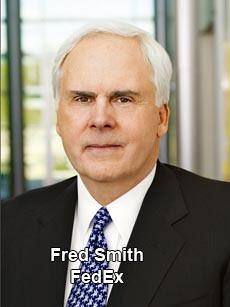The man who authored perhaps the most famous and influential term papers in business history, Fred Smith, died late last week at age 80. Fred Smith was the founder of FedEx.
The story is well known.
Studying economics at Yale, Smith’s 1965 term paper pitched the idea of creating a logistics company that would carry only cargo, and do so for a package’s end-to-end journey, such that a package could be delivered almost anywhere in the US overnight.
Supposedly Smith only received a grade of C on his submission, with the professor commenting that the idea wasn’t practical.
We’re not sure if the name of the short-sighted professor has ever been identified.
Smith graduated from Yale in 1966 and joined the Marines, leaving the service as a captain. He did two tours in Vietnam and was awarded a Silver Star, Bronze Star, and two Purple Hearts.
FedEx said Smith “would often joke that he received his ‘business degree’ from the USMC.”
In 1971, Smith started to put that college term paper idea into action. He founded a new freight company called “Federal Express,” to denote his national ambitions. He also hoped the federal Reserve would become an early customer (it didn’t). Operations began in 1973 with 14 aircraft, and a package hub in Memphis.
According to the National Review, “It was not inevitable that FedEx would succeed. The early years were rough, both due to Smith’s personal troubles (a lawsuit by his half-sisters and a hit-and-run incident for which charges were later dropped) and high fuel prices from the 1973 OPEC embargo. Smith’s pilots were asked to use their personal credit cards to buy fuel and stagger cashing their paychecks.”
(See More Below)
|
CATEGORY SPONSOR: SOFTEON |
|
|
| |
| |
|
|
At one point, the company was down to its last $5,000 — which Smith took to Las Vegas and turned into $27,000 playing blackjack. That was enough money to get FedEx through the week.
 FedEx made its first annual profit in 1976 and has been profitable almost every year since then. The company basically invented overnight nationwide package delivery and other things that characterize modern logistics. FedEx made its first annual profit in 1976 and has been profitable almost every year since then. The company basically invented overnight nationwide package delivery and other things that characterize modern logistics.
It also led the charge for real-time tracking of parcels on their journey by scanning the “FedEx barcode,” which set the standard for the rest of the logistics sector.
Modern logistics likely would not have been possible were it not for the government getting out of the way. Deregulation undertaken by Jimmy Carter meant that the federal government no longer had to approve routes and prices for interstate air transportation. The government abolished the Civil Aeronautics Board under the direction of regulatory economist Alfred Kahn. Without those constraints, FedEx could afford to buy larger planes and by 1983 had revenue over $1 billion.
Smith soon realized that the market for its services was much larger than Smith initially thought. It built out its ground network alongside its air service and took the invention of e-commerce in stride. Today:
--FedEx makes an average of 16 million deliveries per day, or 185 deliveries per second.
--It is the largest cargo airline in the world, with about 700 airplanes, and its delivery fleet includes about 200,000 motorized vehicles.
--FedEx employs over 500,000 people (370,000 in the U.S.) at over 5,000 facilities worldwide.
--Its website processes 500 million package tracking requests each day.
RIP Fred Smith, one of the most consequential figures in the history of supply chain.
Any reaction to the passing of Fred Smith? Let us know your thoughts at the Feedback section below.
|